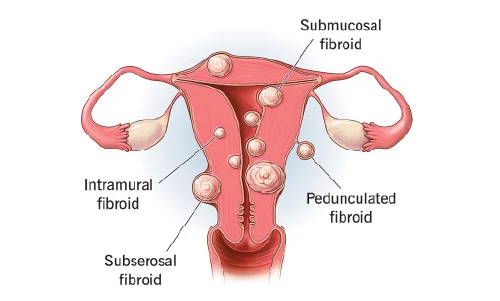Uterine fibroids are non-cancerous growths in the uterus, often causing symptoms like heavy menstrual bleeding, pelvic pain, and infertility. Treatments range from medication to surgery, addressing complications such as anaemia and reproductive issues.
If you're considering treatment for uterine fibroids, reach out to us or book a direct appointment with our gynaecologist. At the CK Birla Hospital, we are dedicated to ensuring that your uterine fibroid treatment is as safe, comfortable, and effective as possible. We're here to guide you every step of the way toward a successful recovery.

The development of fibroids remains unclear, but several factors may contribute, which are:
Certain individuals have an elevated risk of fibroid development if they exhibit one or more of the following factors:
Uterine fibroids, common in childbearing years, may not always exhibit symptoms but can lead to health issues and other problems, such as:
There are various categories of uterine fibroids based on their location and attachment method. These include:
Treatment for uterine fibroids is tailored based on various factors such as size, number, and location of fibroids, as well as the symptoms they cause. The various types of treatment include:
Medication Options:
Surgical Options:
It’s crucial to discuss treatment options with a healthcare provider, considering individual circumstances and preferences. Always consult before starting any new medication or procedure.
The advantages of laparoscopic/robotic uterine fibroid surgery over traditional uterine fibroid surgery are summarised below:
| Feature | Laparoscopic/Robotic Surgery | Open Surgery |
| Incision size | Small, keyhole incisions | Larger, single incision |
| Recovery time | Generally shorter | Longer |
| Postoperative pain | Typically less | Typically more |
| Hospital stay | Shorter (often same-day discharge) | Longer |
| Cosmetic result | Minimal scarring | More noticeable scar |
| Return to normal activities | Quicker | Slower |
However, the choice between laparoscopic/robotic and open surgery depends on individual patient factors and surgeon expertise. Each method has its own set of advantages and should be considered in the context of the patient’s overall health and specific circumstances.
Surgery (e.g., myomectomy, hysterectomy)
Minimally invasive procedures (e.g., uterine fibroid embolization, MRI-guided focused ultrasound surgery)
Medications (e.g., hormonal therapy, GnRH agonists)
Uterine fibroids are noncancerous growths in the uterus that often appear during the childbearing years. Muscle and fibrous tissue make up these growths, which come in different sizes.
Symptoms can include heavy menstrual bleeding, prolonged menstrual periods, pelvic pain or pressure, frequent urination, difficulty emptying the bladder, constipation, backache, and leg pains.
Uterine fibroids are almost always non-cancerous, but in rare cases, a fibroid may contain cancerous cells. These are called leiomyosarcomas and are typically identified through imaging tests or after removal.
Depending on their size and location, uterine fibroids can sometimes interfere with fertility. However, many women with fibroids can conceive and carry a pregnancy to term without any issues.
The cost of a uterine fibroid treatment varies as per the specific type of treatment advised by a healthcare provider, such as:
The cost can also vary widely depending on several factors, including the location, the extent of the procedure, the surgeon’s experience, and the hospital’s pricing structure.
To get an explicit estimate for the cost of uterine fibroid treatment at the CK Birla Hospital, contact the hospital directly. Additionally, you can consult with our board-certified gynaecologist to discuss your specific needs and receive a personalised quote for the procedure.